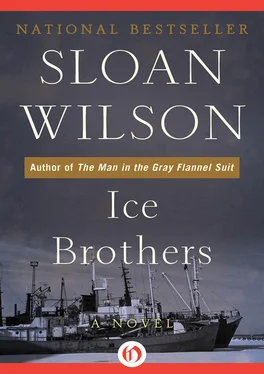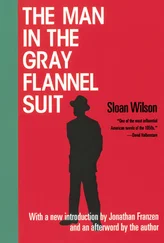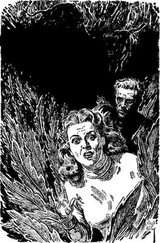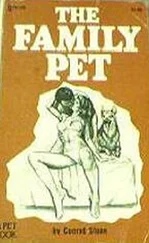Obviously the best thing that Mowrey could do would be to forget the whole episode, wake up and laugh it off. Paul had been counting on him to do that when he neglected to make the entry in the log, but perhaps he had underestimated the vengeful aspect of Mowrey’s character, the unreasoning hatred he had for Nathan and the curious contempt he seemed to have for Seth. If “Mad Mowrey” was really going mad, as he sometimes appeared to be doing, because of his vast consumption of alcohol or the growth of lifelong diseases of the spirit, a board of investigation should in normal circumstances pin most of the blame, at least, on him, but there was nothing exactly normal about this first year of the war. The Coast Guard, Paul realized, was an old-boy network, like the other services. As a mustang, Mowrey had not ranked high in it, but he certainly ranked far above the thousands of incompetent reserve officers whom the old boys were trying to sort out. As Mowrey well knew, the acute shortage of ice pilots gave men who knew the Arctic well a kind of immunity to ordinary rules and regulations. In time of war, anything which worked fast had to be done. The commander of GreenPat probably would not bother to undertake a long investigation of the doings of a trawler’s drunken night in a tiny Greenland village, and he was unlikely to waste the time of his senior officers on the endless procedures of a court-martial which could end only by making everybody look bad. The practical, pragmatic course of action for “Commander GreenPat” was simply to forget all legal charges and transfer the officers whom Mowrey didn’t like to some other unit. If it was necessary to find some rotten assignment for the reserve officers to keep the old ice pilot happy, that could easily be arranged. It might be wise to make an example of reserve officers who made trouble with the old hands, who couldn’t fit into a military organization smoothly. If Nathan and Seth were transferred to some tiny supply depot or weather station deep in the Arctic wastes, they would have no opportunity to complain or to make recriminations. Even in peacetime, any member of the service was by honor and law bound to accept any assignment given to him, wasn’t he?
The more Paul thought about it, the surer he was that this was the way the whole mess would be resolved. Nathan and Seth would get fitness reports bad enough to block future promotions or reassignment to any meaningful job. And if he himself tried to protect them by refusing to write their troubles up in the log, or even by trying too hard to present a case for them while talking with Mowrey, he might easily end up by joining them. It would, after all, be just as easy to transfer three reserve officers as two. If he demanded some sort of hearing, he guessed that few of the enlisted men aboard the Arluk would testify in his favor. To save their own skins, they would want to avoid a full investigation and would back the most powerful man aboard the ship.
Paul felt sick. Opening his eyes and squinting in the bright sunlight, he saw that Seth was still in his bunk, but Nathan was sitting at the table writing something. What would happen if Nathan turned out to be a sea lawyer and stubbornly demanded an investigation, or formally pressed his own charges? If it had to be proved that the captain was drunk, it would have to come out that Paul had not exactly spent the night as a teetotaler. Probably the Danes would be called as witnesses.
Suddenly Paul was angry at Nathan and Seth. There was no great crime, after all, in going ashore to get drunk, as the captain and he had done, but Nathan and Seth had been on duty aboard ship, they had stayed cold sober, and still hadn’t been able to control the crew. If they had gone to sleep early and had awakened to find themselves in the midst of a drunken set-to they might have just given up, once they had found that the skipper and executive officer were drunk ashore, but Paul knew that Nathan, at least, was just not that weak. No, Nathan sympathized with the enlisted men, felt it was unfair to deny them a party while the officers had one ashore, and probably turned a blind eye and a deaf ear to the theft of the booze at the start. Perhaps he hated Mowrey enough to get some kick out of the revenge of the enlisted men. Maybe he liked seeing Mowrey’s crew fuck up after all the old man’s attempts at discipline. If the whole ship was to be disgraced and punished after treating him so harshly, maybe Nathan would take pleasure in the revenge.
As he thought about this, Paul’s anger built. Nathan was always so goddamn righteous, so long suffering, so put upon! Sure, Mowrey didn’t like Jews and made no secret of it. That was wrong, ugly, but wasn’t Mowrey maybe a little justified in his contempt for Nathan as an officer? Openly ignorant of everything nautical, basically disdainful of everything military, eternally seasick and a thinly disguised intellectual snob, Nathan wasn’t really all that much of an asset to the ship. If as an electronic specialist he’d been assigned to a trawler as a wartime mistake, he could have had the guts to fight for a transfer instead of making a virtue of being so damn passive, couldn’t he? Passive— that’s what Nathan was, when faced by a crew difficult to control, a storm at sea, or an overaggressive commanding officer who was egged on by passivity. If they had to battle a German icebreaker, Nathan might also be too passive to return gunfire effectively. His passivity could be the death of himself and of all of them. Already, by allowing the crew to run riot, he had brought a kind of disaster on everyone aboard. And then he began to shake his head and pull himself up short. Jesus Christ, what was he doing …?
Yet this was not really a fair interpretation, Paul realized as his anger peaked. Nathan was undoubtedly doing as best he could in a situation which was nearly impossible for him. His passivity was really part of his courage, his refusal to give up and beg for a transfer. He was doing everything he could to learn an entirely new profession, and if the captain would give him a chance, could soon become an effective officer, Paul was sure. Part of Paul’s anger was fear and guilt, fear that Mowrey would kill him if he tried to stand up for his friend, and guilt because he was tempted to side with strength and turn against Nathan.
Pulling a pillow over his face to shield his eyes from the sunlight, Paul tried to go back to sleep. He had just succeeded when a messenger came to announce that the captain wanted to see him on the bridge “right now.”
As Paul hurried to put on his clothes, Nathan said “Good morning” in a curiously normal voice.
“Is it? I got to go face some Mowrey music.”
Nathan shrugged, a habitual gesture, and began to write in his notebook.
Paul wondered whether he was keeping a private record of events which he planned to submit to a court of inquiry. Oh, quit it, he told himself. The guy has a right. Wasn’t his pique mostly self-serving? And wasn’t his stuff about Nathan’s passivity and fitness as an officer mostly rationalization to take him off the hook with his own conscience if he did what Mowrey wanted? Why did he imagine that Nathan was plotting some kind of revenge? The man had never threatened that.
Without taking time to shave, Paul splashed his face with cold water, dried it on a dirty hand towel, and hurried to the bridge. Mowrey was alone there, hunched on a tall stool by the wheel. He looked pale and for once he was neither smoking or drinking.
“Where the hell have you been?” His voice was still strong.
“Sacked out.”
“I’ve been standing watch here myself most of the night. Remember, you and I are the only commissioned officers on duty now. I’ll take the eight to twelve. We’ll give Boats the twelve to four and you take the four to eight.”
Читать дальше












